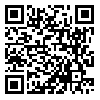Volume 28 - Supplementary
IBJ 2024, 28 - Supplementary: 115-115 |
Back to browse issues page
Download citation:
BibTeX | RIS | EndNote | Medlars | ProCite | Reference Manager | RefWorks
Send citation to:



BibTeX | RIS | EndNote | Medlars | ProCite | Reference Manager | RefWorks
Send citation to:
Sobhanian P, Eslami S, Ghezel M A. Attitudes and Readiness of Iranian Medical Science Students toward Artificial Intelligence: A Cross-Sectional Study. IBJ 2024; 28 :115-115
URL: http://ibj.pasteur.ac.ir/article-1-4508-en.html
URL: http://ibj.pasteur.ac.ir/article-1-4508-en.html
Abstract:
Introduction: The study aimed to assess medical science students' attitudes and readiness toward artificial intelligence (AI) to enhance AI education in the healthcare field, ultimately leading to better patient outcomes.
Methods and Materials: The present cross-sectional study evaluated the attitudes and readiness of medical science students at Mazandaran University of Medical Sciences (MAZUMS) towards AI between December 2023 and March 2024. The online survey form consisted of 31 questions divided into three sections: demographics, AI education, and AI readiness, using the validated Persian version of the MAIRS-MS scale. Data was collected electronically, and statistical analysis was performed using SPSS version 22 software and Excel.
Results: This study surveyed 637 Iranian medical science students at MAZUMS in Iran. Most respondents were medical students, with 54.2% preclinical and 45.8% clinical years. The majority (80.7%) learned about AI through media, and many were interested in the application of AI in their work, potential job replacements, and global health implications. Radiology, general surgery, and diagnostic approaches were observed as the medical careers most affected by AI. Students rated their readiness highest in the ethics domain and lowest in the cognition domain on the Medical AI Readiness Scale for Medical Students (MAIRS-MS). The overall mean MAIRS-MS score was 63.19 out of 100. Students who had received AI education or were interested in AI models scored significantly higher on the MAIRS-MS.
Conclusion and Discussion: Our finding shows the importance of integrating AI education in medical schools to train healthcare professionals effectively. Students are interested in AI applications but lack readiness, emphasizing the need for enhanced AI education to prepare them for utilizing AI in healthcare.
Methods and Materials: The present cross-sectional study evaluated the attitudes and readiness of medical science students at Mazandaran University of Medical Sciences (MAZUMS) towards AI between December 2023 and March 2024. The online survey form consisted of 31 questions divided into three sections: demographics, AI education, and AI readiness, using the validated Persian version of the MAIRS-MS scale. Data was collected electronically, and statistical analysis was performed using SPSS version 22 software and Excel.
Results: This study surveyed 637 Iranian medical science students at MAZUMS in Iran. Most respondents were medical students, with 54.2% preclinical and 45.8% clinical years. The majority (80.7%) learned about AI through media, and many were interested in the application of AI in their work, potential job replacements, and global health implications. Radiology, general surgery, and diagnostic approaches were observed as the medical careers most affected by AI. Students rated their readiness highest in the ethics domain and lowest in the cognition domain on the Medical AI Readiness Scale for Medical Students (MAIRS-MS). The overall mean MAIRS-MS score was 63.19 out of 100. Students who had received AI education or were interested in AI models scored significantly higher on the MAIRS-MS.
Conclusion and Discussion: Our finding shows the importance of integrating AI education in medical schools to train healthcare professionals effectively. Students are interested in AI applications but lack readiness, emphasizing the need for enhanced AI education to prepare them for utilizing AI in healthcare.

| Rights and permissions | |
 |
This work is licensed under a Creative Commons Attribution-NonCommercial 4.0 International License. |







.png)
